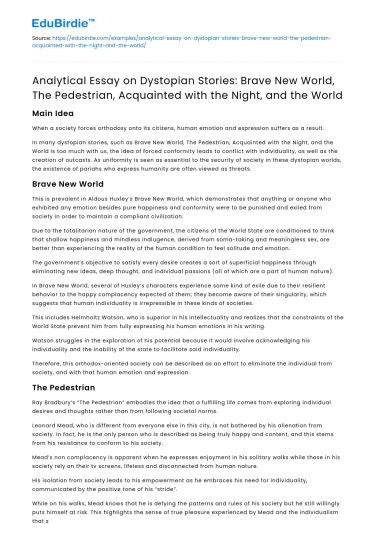Main Idea
When a society forces orthodoxy onto its citizens, human emotion and expression suffers as a result.
In many dystopian stories, such as Brave New World, The Pedestrian, Acquainted with the Night, and the World Is too much with us, the idea of forced conformity leads to conflict with individuality, as well as the creation of outcasts. As uniformity is seen as essential to the security of society in these dystopian worlds, the existence of pariahs who express humanity are often viewed as threats.
Save your time!
We can take care of your essay
- Proper editing and formatting
- Free revision, title page, and bibliography
- Flexible prices and money-back guarantee
Brave New World
This is prevalent in Aldous Huxley’s Brave New World, which demonstrates that anything or anyone who exhibited any emotion besides pure happiness and conformity were to be punished and exiled from society in order to maintain a compliant civilization.
Due to the totalitarian nature of the government, the citizens of the World State are conditioned to think that shallow happiness and mindless indlugence, derived from soma-taking and meaningless sex, are better than experiencing the reality of the human condition to feel solitude and emotion.
The government’s objective to satisfy every desire creates a sort of superficial happiness through eliminating new ideas, deep thought, and individual passions (all of which are a part of human nature).
In Brave New World, several of Huxley’s characters experience some kind of exile due to their resilient behavior to the happy complacency expected of them; they become aware of their singularity, which suggests that human individuality is irrepressible in these kinds of societies.
This includes Helmholtz Watson, who is superior in his intellectuality and realizes that the constraints of the World State prevent him from fully expressing his human emotions in his writing.
Watson struggles in the exploration of his potential because it would involve acknowledging his individuality and the inability of the state to facilitate said individuality.
Therefore, this orthodox-oriented society can be described as an effort to eliminate the individual from society, and with that human emotion and expression.
The Pedestrian
Ray Bradbury’s “The Pedestrian” embodies the idea that a fulfilling life comes from exploring individual desires and thoughts rather than from following societal norms.
Leonard Mead, who is different from everyone else in this city, is not bothered by his alienation from society. In fact, he is the only person who is described as being truly happy and content, and this stems from his resistance to conform to his society.
Mead’s non complacency is apparent when he expresses enjoyment in his solitary walks while those in his society rely on their tv screens, lifeless and disconnected from human nature.
His isolation from society leads to his empowerment as he embraces his need for individuality, communicated by the positive tone of his “stride”.
While on his walks, Mead knows that he is defying the patterns and rules of his society but he still willingly puts himself at risk. This highlights the sense of true pleasure experienced by Mead and the individualism that saves his humanity.
Therefore, Ray Bradbury indicates that in a depraved society, one’s humanity is kept through nonconformity and that it is better to live fully and be punished for it than to live the kind of life that the citizens of this future world lead.
Acquainted With the Night
Acquainted with the night by Robert Frost illustrates the expression of human emotion that stems from isolation.
The speaker asserts that despair and darkness are a part of the human condition that is faced when experiencing isolation.
His familiarity with his human emotions of depression is represented by both his familiarity with the “night” which is often symbolic for despair and sorrow and his characterization of the “city lane” as the “saddest” which reflects the heightening of his vey human emotions.
Furthermore, the speaker says that he is “acquainted” with the night, ironically implying that the only thing the speaker is connected to in his society is disconnection itself.
As the speaker suffers from a self-perpetuating cycle of isolation and despair, the poem suggests that sorrow is an inherent part of the human experience that is only accessible when bot being able to connect with society.






 Stuck on your essay?
Stuck on your essay?

